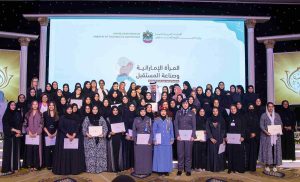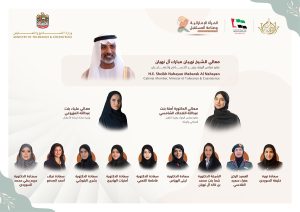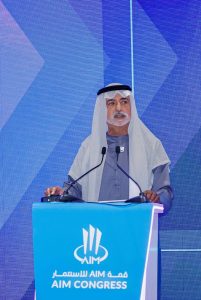GENEVA, 21st September, 2016 (WAM) — The UAE has taken part in a panel discussion entitled, Muslims in Europe: The Road to Social Harmony , which took place recently at the Palais des Nations in Geneva, organised by the Geneva Centre for Human Rights Advancement and Global Dialogue as a side-event to the 33rd session of the UN Human Rights Council.The partners in the organisation of the event were the Permanent Mission of Algeria to the UN and other international organisations in Switzerland, and the Independent Permanent Commission on Human Rights of the Organisation of Islamic Cooperation. The discussion was an opportunity to present a study mandated by the Geneva Centre to the renowned Swiss-Algerian intellectual, Dr. Zidane Meriboute.The Chairman of the Geneva Centre’s Board of Management, Dr. Hanif Al Qassim, Ambassador Boudjemaa Delmi, Permanent Representative of Algeria to the UN and other international organizations in Switzerland, and Ambassador Abdul Wahab, Chairman of the Independent Permanent Commission on Human Rights of the Organisation of Islamic Cooperation, pronounced the opening remarks and inaugurated the debate.The members of the panel were, Dr. Zidane Meriboute, author of Muslims in Europe: the Road to Social Harmony , Ambassador Abdul Wahab, Chairperson of the Independent Permanent Human Rights Commission of the OIC, Ms. Gloria Nwabuogu, Human Rights Officer at the Anti-Discrimination Section of the Office of the UN High Commissioner for Human Rights, and Dr. Fawzia Al Ashmawi, President of the Forum for European Muslim Woman. Ms. Bariza Khiari, member of the Senate of France, representing the city of Paris, and member of the Foreign Affairs, Defence and Armed Forces Committee of the Senate, also sent a written statement on the topic, which was made available to the participants. The discussion was moderated by Idriss Jazairy, Executive Director of the Geneva Centre.In his opening remarks, Dr. Hanif Al Qassim highlighted the importance of showing solidarity towards all the victims of terrorism, the majority of which are of the Islamic faith. He said that solidarity is the best way to address the common challenges to both European and Muslim communities, namely terrorist crime, violent extremism and xenophobia.Dr. Al Qassim noted that all of the world’s religions are vehicles for peace and harmony, and he warned against the growing trend of distorting the message of Islam by nurturing the conflation of the Muslim faith with terrorism. He deplored media manipulation that provided violent extremists with unfounded religious legitimacy and unsolicited propaganda, and quoted His Holiness Pope Francis, who has also condemned the erroneous association between Islam and violence. Dr. Al Qassim concluded his remarks by stating that Muslim communities were being caught ‘between hammer and anvil’, facing, on the one hand, the imminent threat of terrorist groups, and, on the other hand, a growing trend of Islamophobia and the emergence of xenophobic populism.Ambassador Boudjemaa Delmi said that he deplored the growing confusion in the perception of Muslim communities in Europe, as well as the proliferation of provocative actions, stigmatisation and segregation. Ambassador Delmi spoke on the need to take action in order to avoid these misleading situations, as well as to consolidate social cohesion while fighting against discrimination and marginalisation. He also emphasised that integration processes are not synonymous with assimilation and encompass a number of phases, including reception, transition and adaptation.Ambassador Delmi highlighted the important role played by civil society in supporting the actions taken by states with regard to social harmony, and applauded the all different, all equal initiative of the Council of Europe in this regard. He also formulated a set of recommendations for a better integration of the Muslim dimension in the context of the European identity, and encouraged initiatives for raising the awareness of non-Muslim European citizens on topics related to Islam.Ambassador Abdul Wahab underlined the important role played by the Independent Permanent Human Rights Commission of the OIC in the promotion of human rights and of inter-religious and inter-cultural dialogue. He insisted that the event was not an occasion to play the blame game; as blame games were always counter-productive , but an opportunity to invoke the collective responsibility to promote mutual understanding, harmony and stability, as influential voices in the field of human rights.Ambassador Wahab recalled the consensus that led to the adoption of the important Human Rights Council Resolution 16/18 in 2011, a comprehensive framework for tackling the problems of discrimination and violence based on religion or belief. Stating that the Istanbul Process was a useful way of keeping this consensus alive, he insisted however on the urgency of implementing and taking concrete actions to follow-up on this framework. Echoing the statements of all panelists, he deplored the false association of Islam with violence, recalling that Islam as all religions, upholds peace and harmony.In his statement, Ambassador Jazairy, Executive Director of the Geneva Centre and Moderator of the panel, noted in his opening statement that the antithesis of the panel discussion was precisely a declaration made by the leader of one of the European Union states, saying that Islam did not belong spiritually in Europe, as it was allegedly incompatible with Christian values. Underlining, on the contrary, the long history of Islam in Europe, as a continuator of the Abrahamic religions (Judaism and Christianity), Ambassador Jazairy recalled that Islam was the second religion in France after the Christian faith, and that 75% of Muslims in the country were of French nationality. Ambassador Jazairy deplored the tendency in Europe to reduce all persons associated with the Islamic sphere to their religious identity dimension, whilst ignoring their professional abilities, or the role they play in their family or their neighbourhood. He also warned against all generalisation regarding Muslims as this was a source of errors.Ambassador Jazairy supported the promotion of social harmony in schools, the consolidation of the openness to the other , and the need to bear in mind Voltaire’s saying, to paraphrase: I do not like what you are wearing, but I shall fight to death so that you have the right to wear it. The moderator of the debate also quoted the Emir Abdelkader’s statement, If the Muslims and Christians had paid attention to me, I would have stopped their quarrels. They would have become externally and internally brothers. Ambassador Obaid Salem Al Zaabi, the UAE’s Permanent Representative to the UN, delivered a statement from the floor during the debate with the audience. He highlighted the importance of the theme and the need for a multi-sector, comprehensive approach to formulate recommendations for reaching social harmony. Ambassador Al Zaabi quoted His Highness Sheikh Mohamed bin Zayed Al Nahyan, Crown Prince of Abu Dhabi and Deputy Supreme Commander of the UAE Armed Forces, who, during a recent visit to the Vatican, emphasised the urgent need for stronger cooperation between countries and organisations to adopt policies that promote tolerance, dialogue and constructive communication between civilizations.Ambassador Al Zaabi spoke of the UAE’s success in creating a model of coexistence and tolerance, illustrated by the recent establishment of a Ministry of Tolerance. He encouraged Muslim communities in Europe to participate more proactively in the economic, social and cultural activities of the host countries to encourage intercultural cooperation. He also underlined once more the important role played by the media and civil society in the promotion of multiculturalism and tolerance.



